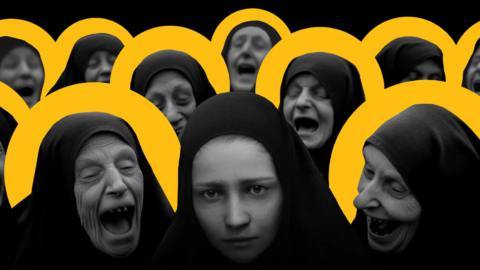
Indika, unhelpfully for a desperately devout Orthodox nun in early 19th Century Russia, is in communion with the Devil. Or maybe she just isn’t as piously pure of thought as she’d like to believe. In the slippery, shifting world of Indika (I’m talking about developer Odd Meter’s wonderfully confounding platform adventure now, not the character – brace yourself for some back-and-forth there), disorientating, uneasy ambiguity reigns over all.
Which isn’t to say Indika the game is afraid to commit; this is an astonishingly confident experience, so full of swagger and style, so fearless in its presentation and thematic reach, it’s hard not to be immediately taken in. Indika opens very much as it means to go on, beginning not with a dreary pan across the snow-battered Russian landscape, but with a dreamy, expectation confounding interactive free-fall through an inverted world, brazenly presented in the style of a 16-bit arcade game and accompanied by a muffled, insistent cacophony of song. Then, as the miserable reality of Indika’s convent snaps back into focus with a crash of metal on parquet and the first of many striking directorial decisions – here, the cutscene camera remains firmly fixed on Indika’s wretched face as the world around her tilts and swirls – Odd Meter deals its next hand.
Indika the character, as becomes immediately apparent when the game relinquishes control moments in and her idle animation takes over, is an extraordinary creation. Not only is she brought to life through a wonderfully nuanced vocal performance by Isabella Inchbald (the game’s English translation is consistently strong and its voice cast superb), her complex, conflicting inner life is evident just from the way she moves. She’s a twitching, restless ball of nervous energy; awkwardly shifting her weight from one foot to the other, eyes darting back and forth, occasionally chewing on her fingernails or wringing her hands.






